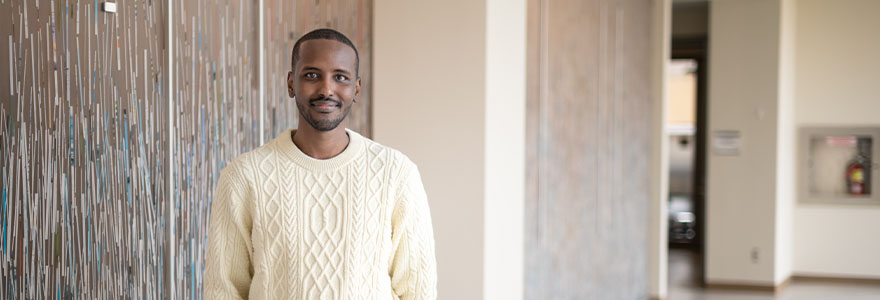Abdifatah Fiqo, Class of 2023
Abdifatah Fiqo: Changing careers for the better

Abdifatah Fiqo, MPH Candidate, hopes to bring change where it is needed most. (Photo: Schulich Communications/Mac Lai)
By Cam Buchan
While change may be a challenge for many people, it was a change for the better for Abdifatah Fiqo.
After graduating in 2013 from York University with a Bachelor of Science in Kinesiology and Health Sciences, Fiqo worked in the health and fitness space. From there, he transitioned into the insurance industry where he assessed disputed insurance claims, examining a claimant’s functional capabilities. In this space, he realized the importance of preventative care, and his interest in public health was born.
“It was here I realized that independent examinations weren’t my passion, and I did a whole career change,” said Fiqo, now part of the Master of Public Health Program at Schulich Medicine. “I asked myself, ‘If you could do anything right now, what would you do?’ I was doing this right in the middle of COVID, and so public health was very much in the news, and it looked like a career where I could help populations rather than individuals.”
The Master of Public Health Program, with its 12-month, case-based learning approach, provided Fiqo with the latitude to learn a wide variety of skills.
“With public health, you’re trying to change society from the top,” said Fiqo. “One of the advantages of public health is that you have a louder voice to get information to a greater number of people.”
Fiqo is most hopeful of seeing change in the Black community. Coming from Somalia, Fiqo is well aware of the mental health issues faced by Black communities and how these topics are often not addressed.
“Mental health isn’t really talked about much in African culture,” he said. “There’s a lot of taboo around it and that’s how I grew up for most of my life, even in undergrad. I just kind of put my head down and pushed through.”
But the more he investigated the issue, the more he realized how difficult it was for his community to verbalize the problem.
“Other communities have learned the skills to deal with mental health challenges. They know how to reach out for help. Coming from Somalia, I see a lot of my community struggling,” he said.
Fiqo’s goal is to become an advocate for Black mental health, especially in the Somali community. He hopes to work in the public sector, developing policies and tools to help the Black community voice their needs and know where to go for support.
“One thing I can do is to provide my own context – a Black male perspective – and say this is what I experienced going through these issues; this is the best way to approach these challenges.”
Looking ahead, Fiqo has a number of career goals he hopes to achieve.
“I think my career will be successful based not on money, but on how many people I’ve been able to help with my position,” he said. “Yes, I’ve experienced racism, but I also acknowledge I’m in a privileged position – I can take this program and use what I learn to help people.”
Fiqo looks to provide help to the Black community through creating advocacy groups for Black students and workers and helping them feel like they belong.
“If I were to give advice, it would be don’t be afraid to jump in. I’m in my 30s now, and I’ve completely changed my career. I’m starting something completely new with public health. So, I would say especially to Black people, don’t be afraid to advocate for yourself and your goals.”








